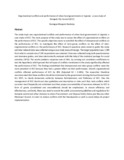| dc.contributor.author | Busingye, Margaret Bashaija | |
| dc.date.accessioned | 2018-07-30T15:47:27Z | |
| dc.date.available | 2018-07-30T15:47:27Z | |
| dc.date.issued | 2012 | |
| dc.identifier.uri | http://hdl.handle.net/20.500.12305/315 | |
| dc.description | A Dissertation submitted to the Higher Degrees Department in partial fulfillment of the requirements for the award of the Master’s Degree in Management Studies (Public Administration and Management) of Uganda Management Institute | en_US |
| dc.description.abstract | The study topic was organizational conflicts and performance of urban local governments in Uganda: a case study of KCC. The main purpose of the study was to assess the effect of organizational conflicts on the performance of KCC. The specific objectives were: to establish the effect of interpersonal conflicts on the performance of KCC, to investigate the effect of intra-group conflicts on the effect of inter-organizational conflicts on the performance of KCC. Research questions were raised to guide the study and later relevant data was collected using a case study research design. The target population was 1,789 from which a sample size of 350 respondents was selected. Data was collected using both questionnaires and interview guides, and later electronically analyzed with the help of the statistical package for social scientists (SPSS). The results yielded a response rate of 54%, by carrying out correlation coefficients to test the hypothesis which proved that all types of conflicts mentioned in the study significantly affected the performance of KCC. The findings established that interpersonal and inter group conflicts were the most prevalent in KCC because they had a greater effect on their performance. Overall, organizational conflicts affected performance of KCC by 38% (Adjusted R2 = 0.38%). The researcher therefore recommended that these conflicts should be minimized by the government revising the local Government Act 1997, to clearly demarcate authority between Administrators and Politicians of KCC. Also the management of KCC should put clear guidelines and description or roles such that, task conflicts which occurred most frequently are minimized and then proper accountability of resources released to KCC in form of grants (conditional and unconditional) should be emphasized, to ensure efficiency and effectiveness, and lastly, there was need to amend the public procurement guidelines and regulations for Kampala central and other divisions to attain Procurement and Disposal Entity Status just like any other Municipal Council, in order to reduce conflicts with the Headquarter as well as avoid delays in project implementation. | en_US |
| dc.language.iso | en | en_US |
| dc.publisher | Uganda Management Institute | en_US |
| dc.subject | Organisational conflicts | en_US |
| dc.subject | Organisational performance | en_US |
| dc.subject | Urban local governments | en_US |
| dc.subject | Kampala City Council | en_US |
| dc.subject | KCC | en_US |
| dc.subject | Interpersonal conflicts | en_US |
| dc.title | Organizational conflicts and performance of urban local governments in Uganda: a case study of Kampala City Council (KCC) | en_US |
| dc.type | Thesis | en_US |

